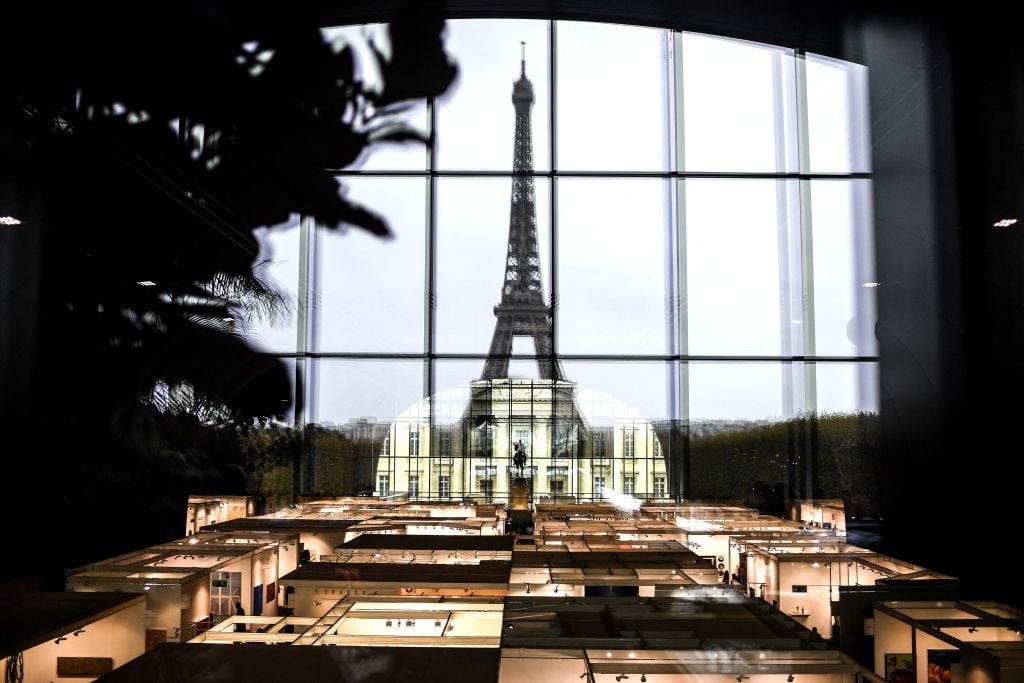
FIAC’s parent company RX France has lambasted the public body that owns the Grand Palais for offering a seven-year fair contract to its competitor MCH, owner of Art Basel, resulting in FIAC losing its home at the prestigious venue.
The decision follows RMN-Grand Palais unexpectedly making an open call for competing offers for the space last December, after it received a proposal from MCH. Michel Filzi, president of RX France, called the procedure “swift and biased” in a statement, adding that it would negatively impact the French contemporary art ecosystem. FIAC was founded in Paris in 1974 and has in recent years become the country’s leading contemporary art fair.
“If the most established events are at the mercy of such brutal, unilateral, and unexpected decisions made by the managers of buildings that can host them in France, it’s obviously our entire sector that will be affected to the greater benefit of our European competitors,” Filzi said, adding, “We reserve the right to challenge the decision concerning FIAC in court.”
Florence Bourgeois, director of RX-owned Paris Photo, which managed to retain its November slot at the Grand Palais for another seven-year contract, told Artnet News: “My reaction is one of sadness and relief: sadness for FIAC and relief for Paris Photo. We need time to digest this painful news and see how we can continue to keep the FIAC brand alive. We’re not at the stage of having a Plan B [about where and when to hold FIAC].”
The news of Art Basel’s parent company ousting FIAC from the Grand Palais has sent shockwaves through the French art scene, and French galleries have responded with astonishment and ambivalence. While some welcome the news of MCH coming to Paris, others are concerned about how it will impact the French gallery scene.
“It’s a thunderclap in the fair milieu,” Marion Papillon, president of France’s Professional Committee of Art Galleries, said. Papillon had been seeking commitments from RMN-Grand Palais and MCH, prior to yesterday’s announcement, that the new fair will “have its own identity.”
“Our first worry is that the Grand Palais has greatly increased the price per square meter, which might be too expensive for some of the medium and smaller-sized galleries,” Papillon said. “Our second worry is whether MCH will be knowledgeable of the French gallery scene and not just invite the big galleries that participate in the group’s other fairs.”
Papillon, who is adamant that French galleries need to be on the selection committee, hopes to meet with Art Basel’s global director, Marc Spiegler, to discuss strategic issues. “This is a different landscape from when Art Basel arrived in Miami or Hong Kong,” she said.
Le Grand Palais Éphémère, Champs de mars, Paris. Wilmotte & Associés Architectes. Photo ©Patrick Tourneboeuf/RMN_GP/Tendance Floue.
Emmanuel Perrotin echoed Papillon’s concerns: “It’s very important that MCH takes the cultural, local particularities into account [and] that the local scene of each fair remains strong in order to avoid a standardization of our sector; the diversity of our milieu is essential.” While paying tribute to the “fantastic work” of FIAC’s director Jennifer Flay, Perrotin added that MCH’s strength, combined with the “incomparable cultural and hotel offerings in Paris,” could only have an “impressive result.”
Meanwhile, Philippe Boutté, director of Magnin-A, described RMN’s decision as a “tidal wave.” He said: “The biggest French fair is disappearing without an epitaph—it’s sad and violent. The idea of a monopoly of big fairs owned by one sole group is worrying. We still don’t know the title of this new fair—‘Art Basel Paris’?”
Gallerist Guillaume Sultana also remarked on the wider implications of the news for the international fair scene. “Now there are practically only two mega groups remaining: MCH, which owns Art Basel, and Endeavor, which owns Frieze,” he said. “They occupy the whole international territory and cover the calendar all year round.”
Nathalie Obadia, who has participated in FIAC since 1994, regretted that the fair was unable to prove itself worthy of having its contract renewed: “Disappointingly, the moment when Paris becomes the European capital of art with a dynamic upswing in both the market and programming in museums and galleries, FIAC—which had the opportunity to rise to a level of excellence—didn’t set everything in motion to become an irreproachable fair in terms of organization and international influence.”
RX’s management has been in chaos in recent months. In October last year, galleries found out in the press that FIAC and Paris Photo would be run by the same scaled-down team pending a 40 percent downsizing of their combined workforces, following a merger between parent companies Reed Expositions France and Reed Midem. After the physical fair was cancelled in 2020, several galleries were unimpressed with sales at the 2021 fair. But few expected that FIAC’s future would be in jeopardy so soon.
“Whatever the inadequacies of RX’s management, I didn’t imagine that a change of fair operator could happen so quickly, leading to the demise of a made-in-France brand that has international success,” Michel Rein said. “It’s perhaps the start of large-scale maneuvers and that one day soon, as rumors have been spreading, MCH will become a French company [owned by LVMH, which has denied the rumors].”
However, others welcome the wings of change. Jérôme Poggi greeted the news positively, remarking that the decision clearly aimed to “strengthen” the French scene. Jocelyn Wolff agreed. “It’s time that a more ambitious project sees the light of day, commensurate with Paris’ development internationally,” Wolff said. “RX didn’t see FIAC’s growth potential despite its brilliant reinvention by Jennifer Flay.” The gallerist also cautioned that Art Basel’s flagship fair could be an unwitting victim if the Paris launch becomes successful: “The risk is that the city of Basel might see its historic fair wither as Paris takes a leading position in Europe.”